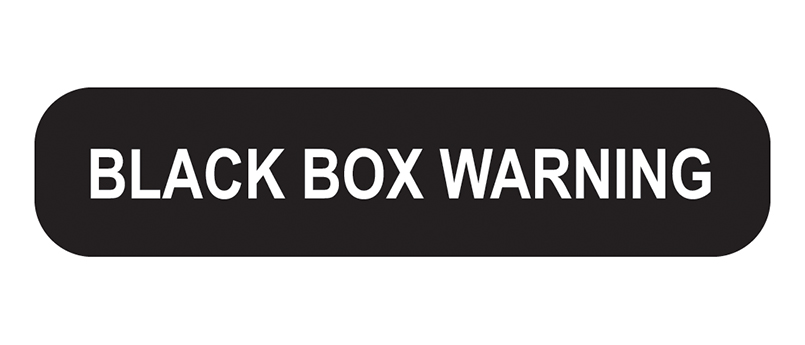A “black box” warning is a consumer warning with a black border placed on labels calling out the product’s serious health risks—like the one that appears on tobacco packaging. This is the most severe type of warning by the Food and Drug Administration (FDA).
 According to prescription drug retailer Walgreen’s, this warning is only used “when there is reasonable evidence of an association of a serious hazard with the drug.” But did you know that there are black box warnings on some of the most common drugs available? In fact, one-third of newly approved drugs from the FDA have received an FDA action, recall or “black box” warning!
According to prescription drug retailer Walgreen’s, this warning is only used “when there is reasonable evidence of an association of a serious hazard with the drug.” But did you know that there are black box warnings on some of the most common drugs available? In fact, one-third of newly approved drugs from the FDA have received an FDA action, recall or “black box” warning!
Because so often consumers aren’t aware of black box warnings and might not know what to do if they suffer an adverse reaction, we jumped on the chance to share this info with you from our friends at ConsumerSafety.org. Below is a list they compiled of popular drugs and why they are black boxed. And, at the end of the article, they’ve provided phone numbers to call if you suffer a reaction and questions you can ask your physician if he prescribes you a black box medication.
Please make sure to share this with your family and friends.
Xarelto (Blood Clots)
Xarelto is an anticoagulant that helps prevent the formation of blood clots. However, there is no antidote to taking this drug. This entails that patients who are harmed by the side effects often bleed to death. The drug works by inhibiting the function of an enzyme in the body called “Factor Xa,” which causes blood to clot.
Real world example: Sharyn Orr from Louisiana died after taking Xarelto. She was in a coma for 10 days after having a stroke shortly after taking the drug.
Why It’s Black Boxed
- Increases stroke + thrombotic event risk when discontinued before completing course
- Increases epidural + spinal hematoma (swelling of clotted blood within body tissue)
Source: https://www.consumersafety.org/legal/xarelto-lawsuit/
Adderall (ADHD)
Adderall is a stimulant, amphetamine drug usually used to treat ADHD but is also frequently used recreationally by college students and other young adults for its effects on concentration/focus.
Real world example: In 2005, Canada banned the once-daily version of Adderall after an international review indicating that 14 children died after taking the drug as prescribed.
Why It’s Black Boxed
- Addictive/likely to be abused
- Increased risk of sudden death and cardiovascular events
Source: https://www.accessdata.fda.gov/drugsatfda_docs/label/2007/011522s040lbl.pdf
Xanax (Anxiety)
Xanax is a benzodiazepine drug used for anxiety. It can also be used to manage phobic behaviors and specific conditions like social anxiety. It’s a sedative. Xanax should never be used in patients with a history of drug abuse, due to its addictive potential. The drug is contraindicated in patients with glaucoma.
Real world example: Up-and-coming rapper Lil Peep died of a Xanax overdose in November of 2017
Why It’s Black Boxed
- Taking Xanax along with opioids may cause sedation and respiratory disorders
- It should only be taken along with other opioid drugs if absolutely necessary and all other options covered
- Minimum dosage is recommended
- Patient needs to be monitored for sedation while taking Xanax
Source: https://www.accessdata.fda.gov/drugsatfda_docs/label/2016/018276s052lbl.pdf
RELATED STORY:
Ciprofloxacin (Bacterial Infection)
Cipro is a member of a class of antibiotics called “fluoroquinolones.” This class of drugs stop bacteria from reproducing by altering their DNA replication pathway. Cipro is used to treat bacterial infections of all different types like chronic bronchitis, infectious diarrhea, urinary tract infections (UTIs) and more. Cipro is not recommended in the pediatric (under 18 years) population due to adverse reactions compared to controls.
Real world example: Richard Pyne of Glasgow was paralyzed after taking a course of cipro for prostatitis.
Why It’s Black Boxed
- Increases potential for inflammatory conditions like tendinitis
- Increases potential to develop nervous system damage resulting in neuropathy or negative central nervous system (CNS) effects
Sources: https://www.rxlist.com/cipro-drug.htm
https://www.accessdata.fda.gov/drugsatfda_docs/label/2005/019537s057,020780s019lbl.pdf
Levothyroxine (Hypothyroidism)
Hypothyroidism is a disease commonly caused by autoimmune issues or radiation therapy. Levothyroxine has the same molecular structure as the hormone thyroxine, which the body produces. Thyroxine, or “T4” as it’s commonly known, is secreted by the thyroid gland and regulates the activity of various organs in the body. Levothyroxine is taken in pill form to treat hypothyroidism, a condition that’s diagnosed by low levels of circulating thyroid hormone.
Real world example: No serious adverse effects associated with this drug
Why It’s Black Boxed
- Consumers taking this drug off-label for weight loss may be at increased risk for a variety of ailments
- High doses may cause toxicity
Source: https://online.epocrates.com/u/10b43/levothyroxine/Black+Box+Warnings
Vicodin (Pain relief)
Vicodin is a synthetic drug formed by combining acetaminophen (the active ingredient in Tylenol) and hydrocodone, which is an extremely powerful opioid. It’s commonly prescribed for pain relief after surgery, and even after less serious surgery like wisdom teeth removal.
Real world example: Vicodin was implicated in a share of the 16,000+ annual opioid fatalities in the U.S.
Why It’s Black Boxed
- Highly addictive
- Increased risk of respiratory depression
- Risk of fatalities from accidental consumption (especially in unaccompanied minors)
- Risk to fetus if taken during pregnancy
- Significantly increased risk of liver damage/failure
Source: https://online.epocrates.com/u/10b1391/Vicodin/Black+Box+Warnings
Zoloft (Depression)
Zoloft is an antidepressant in the category of selective serotonin reuptake inhibitors (SSRIs). These drugs work by blocking the uptake of serotonin in the brain, increasing circulating levels.
Real world example: Natalie Gehrki of Virginia killed herself after dealing with pain from severe adverse drug reactions from Zoloft.
Why It’s Black Boxed
- Increased risk of suicide in several demographics (children, adolescents, young adults)
Source: https://online.epocrates.com/u/10b1444/Zoloft/Black+Box+Warnings
RELATED STORY:
Atenolol (High Blood Pressure)
Atenolol is a beta blocker drug. It works by blocking the release of epinephrine and other stimulatory chemicals in the body that raise blood pressure. Patients must avoid drinking alcohol when on atenolol and discontinue use after major surgery. Blood pressure needs to be monitored when using the drug.
Real world example: A 54-year-old Malaysian patient had severe memory impairment after taking Atenolol, which was reversed by discontinuing the drug
Why It’s Black Boxed
- Patients who discontinue use of atenolol abruptly are likely to get increased angina (chest pain) and arrhythmias
Source: https://online.epocrates.com/drugs/15011/atenolol/Black-Box-Warnings
What to Do If You’re Concerned
- Use the FDA Access Data site to search the drugs you currently take for black box and other warnings.
- Use the Pubmed resource to search through clinical trial and other experimental data relating to drugs you’re taking. If you find something alarming, consider discussing it with your doctor.
- Talk with your pharmacist for a second opinion. They are just as knowledgeable as your doctor about drug safety and interactions and a pharmacist is often willing to spend more time to discuss the drug at length.
Things to Ask Your Doctor or Pharmacist
- Why does this drug have a black box warning?
- What are my alternative options if I have a bad reaction to this drug?
- Are there any interactions with food or medication I should know about?
- Does your practice allow drug representatives to pitch their products (which can often lead to bias)?
How to Report an Adverse Drug Interaction
- Detail your experience electronically on the FDA MedWatch site
- Mail the incident report to the FDA by printing and filling out their Report Form
- Call the FDA directly at 1-800-FDA-1088 and report the incident
Most of us have taken prescription drugs at some point, but an increasing number of synthetic drugs are being labeled by the FDA with “black box” warnings. And so, until the FDA starts taking our health and safety more seriously, educate yourself.
XO- Erin












